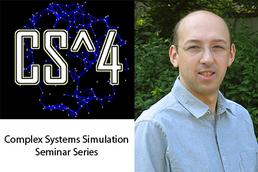Seminar 4th November 2011 4 p.m. University of Southampton, Building 85 (Life Sciences) Room 2209
An evolutionary advantage for extravagant honesty
Professor Seth Bullock, Director, Institute for Complex Systems Simulation (ICSS)
University of Southampton, Electronics and Computer Science
- Web page
- http://www.icss.soton.ac.uk/
- Categories
- Complex Systems, Computer Science, Evolution, Game Theory
- Submitter
- Petrina Butler
Complex Systems Simulation Seminar Series (CS^4)
from the Institute for Complex Systems Simulation, the Complexity in Real-World Contexts USRG, and the Computational Modelling Group.
Speaker
Professor Seth Bullock
Director, Institute for Complex Systems Simulation (ICSS)
Agents, Interaction and Complexity (AIC) Group, School of Electronics and Computer Science, University of Southampton
Abstract
It has not been straightforward for modern evolutionary biology to account for the ubiquity of signalling in nature. Given the pressures on organisms to gain an advantage over their competitors by bluffing, lying and cheating, it is remarkable that they pay any attention to displays, advertisements, threats, warnings, etc., and equally remarkable that so many of these signals are produced in the first place. Moreover, many of these biological signals appear to be needlessly extravagant in terms of the energy spent, time taken, and risks incurred in producing them.
Something seems to be keeping biological signals honest... and also keeping them extravagant. Zahavi's (1975) handicap principle linked these two observations by arguing that honest signalling could be evolutionarily stable only when it was costly or wasteful. However, after several decades of debate and analysis, contemporary models of the handicap principle demonstrate that, although its logic is basically sound, it cannot account for extravagance in natural signalling systems.
These findings make it difficult to understand why peacocks, for instance, construct and maintain a tail that is a significant and, to the disinterested observer, irrational drain on resources. Might the same information not be conveyed through a stable signalling system employing much cheaper signals?
In this talk I will present evolutionary simulation models in which multiple signalling systems compete with one another. Where more than one signalling system is viable, these models suggest that the more extravagant signalling systems will tend to be favoured by evolution.
Refreshments
Available from 3:30pm, lecture starts at 4pm.
Complex Systems Simulation Seminar Series
For the complete CS^4 schedule please click here: http://www.multidisciplinary.soton.ac.uk/cs4.html
Contact
Petrina Butler
Multidisciplinary Research Co-ordinator
University Strategic Research Groups
Research and Innovation Services
p.butler@soton.ac.uk
02380 593244
